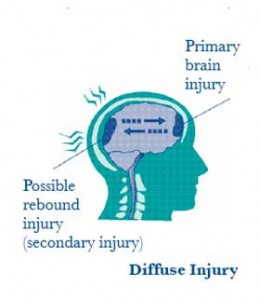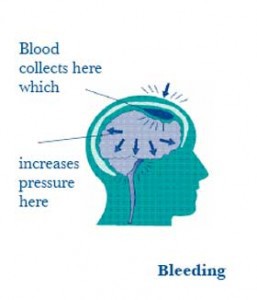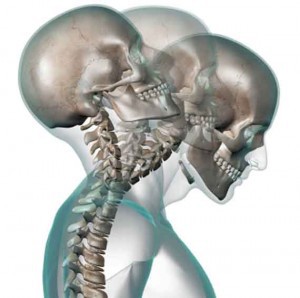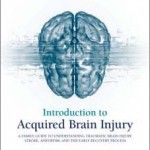An acquired brain injury is a sudden and often accidental injury that results from bleeding, trauma, swelling, or shearing of brain tissue. An acquired brain injury does not include mental conditions present at birth or caused by a health condition, such as Alzheimer’s disease. The primary brain injury can be either traumatic or non-traumatic:
Traumatic brain injury
 Traumatic brain injury (also called TBI) is caused by trauma to the head from a hard blow, fall, car accident, or gunshot or knife wound.
Traumatic brain injury (also called TBI) is caused by trauma to the head from a hard blow, fall, car accident, or gunshot or knife wound.- A closed head injury is when the brain is injured, but the skull is not broken. Common causes of closed head injuries are car accidents, falls, and hard blows to the head.
- An open head injury is when the skull is broken or dented and the brain is injured. Loose bone fragments can put pressure on the brain. Common causes of open head injuries are skull fractures and gunshot or knife wounds.
Non-traumatic brain injury
 Non-traumatic brain injury is caused by:
Non-traumatic brain injury is caused by:
- Anoxia—a complete lack of oxygen to tissues in the brain (such as from a heart attack or carbon monoxide poisoning). Anoxia causes problems with the cells chemical activity and then cell death within a few minutes unless oxygen is restored. Anoxia is rare. Hypoxia is a reduction of the oxygen supply to the tissues and is more common.
- Brain infection; cancer or tumor
- Toxic drugs or chemicals
- Complications of liver disease, kidney disease, or diabetes
- Aneurysm or a stroke (a blockage or rupture of a blood vessel in the brain, also called cerebral vascular accident).
Causes of Brain Injury
Both traumatic and non-traumatic brain injury can result in the following:
- A diffuse injury which affects several areas of the brain and can result from the brain twisting or rebounding (bouncing) inside the skull.
- A focal injury which is limited to one area or one side of the brain.
- A contusion which is a blow to the head hard enough to bruise the brain.
- Bleeding inside the skull, called a hemorrhage, which can result from either a traumatic brain injury, aneurysm, or stroke.
Symptoms of Brain Injury
Symptoms of brain injury will vary person to person depending on the extent of the injury. The following is a general list of symptoms that one may experience if they have sustained a brain injury. It may be important to note that these symptoms may manifest differently in infants, adolescents, adults and elderly.
- Confusion, amnesia, difficulty thinking
- Difficulty speaking, slurred words
- Abnormal laughing or crying
- Sensitivity to light and/or sound
- Muscular instability or stiffness
- Headache, nausea, vomiting
- Depression, anxiety, loneliness, apathy
- Ringing in ears, blurred vision
- Nerve damage
Glasgow Coma Scale
The Glasgow coma scale is a tool that healthcare providers use to determine severity of brain injury. It is comprised of tests such as ability to follow commands, move, and speak. Patients are given points from 3-15 to help determine the extent of brain injury. A lower score is a more severe injury, whereas a higher score is less severe.
Long Term Effects
It is difficult to provide a list of possible or probable long term effects of brain injury as the long term outcomes are dependent on many factors. Factors that will contribute to recovery and long term effects are severity of the injury; location of the injury; how quickly or not the injury was treated; among other unknown factors. It is possible to recover with minimal long term effects and possible to recover with many long term effects. Doctors and other care providers will be able to have this kind of conversation with you as they will know more about the person who has sustained the brain injury.
Possible long term effects may include:
- Mood instability
- Partial paralysis
- Nerve damage (including loss of sensations or numbness)
- Impaired memory
- Coma or loss of consciousness
- Language difficulty
- Altered balance and coordination
- Degenerative conditions (such as Parkinson’s Disease or Alzheimer’s Disease)
- Seizures
Rehabilitation & Recovery
Rehabilitation and recovery depends largely on the severity of the injury; the timing and quality of treatment; location of the injury; and how the person responds to the injury. A prognosis on what recovery and length of recovery will look like is best given in the first 1-2 months post injury.
Recovery on brain injury should not be rushed or expected to be quick. It may be helpful to think of the recovery time taking months to years as opposed to days or weeks.
Depending on the type of injury and symptoms experienced, your care provider team will help determine when and how rehabilitation can be had. Sometimes people can recover in long-term care facilities; in hospitals or at home. Speak with the healthcare team to determine the best options for you and your loved one.
Rehabilitation is usually focused on helping the patient to re-gain ability to perform daily functions. This may include basic skills such as the ability to swallow, walk, and talk.

 Brain Injury: A guide for family and friends
Brain Injury: A guide for family and friends
We not only include information about what you can do and what your loved one is going through, but we also include words of encouragement from people who have actually gone through a brain injury or their loved one.
This guide was published for purchase in paper back form for health care providers and used in hospitals and trauma units. The content is now available here (see our copyright notice at the bottom of the page). It was written in collaboration with Shepherd Center, one of the top catastrophic care hospitals in the U.S.
Table of Contents
• What is a Brain Injury?
• How Bad Is It?
• How the Brain Functions
• Common Problems During Early Recovery
• The Intensive Care Unit (ICU)
• Understanding Coma
• How Does an Injured Brain Heal?
• How You Can Help With Recovery
• Where Will the Journey Go From Here?
• How Will I Ever Get Through This?
• Where to Go for Help
• Books for Families Coping With Brain Injury
